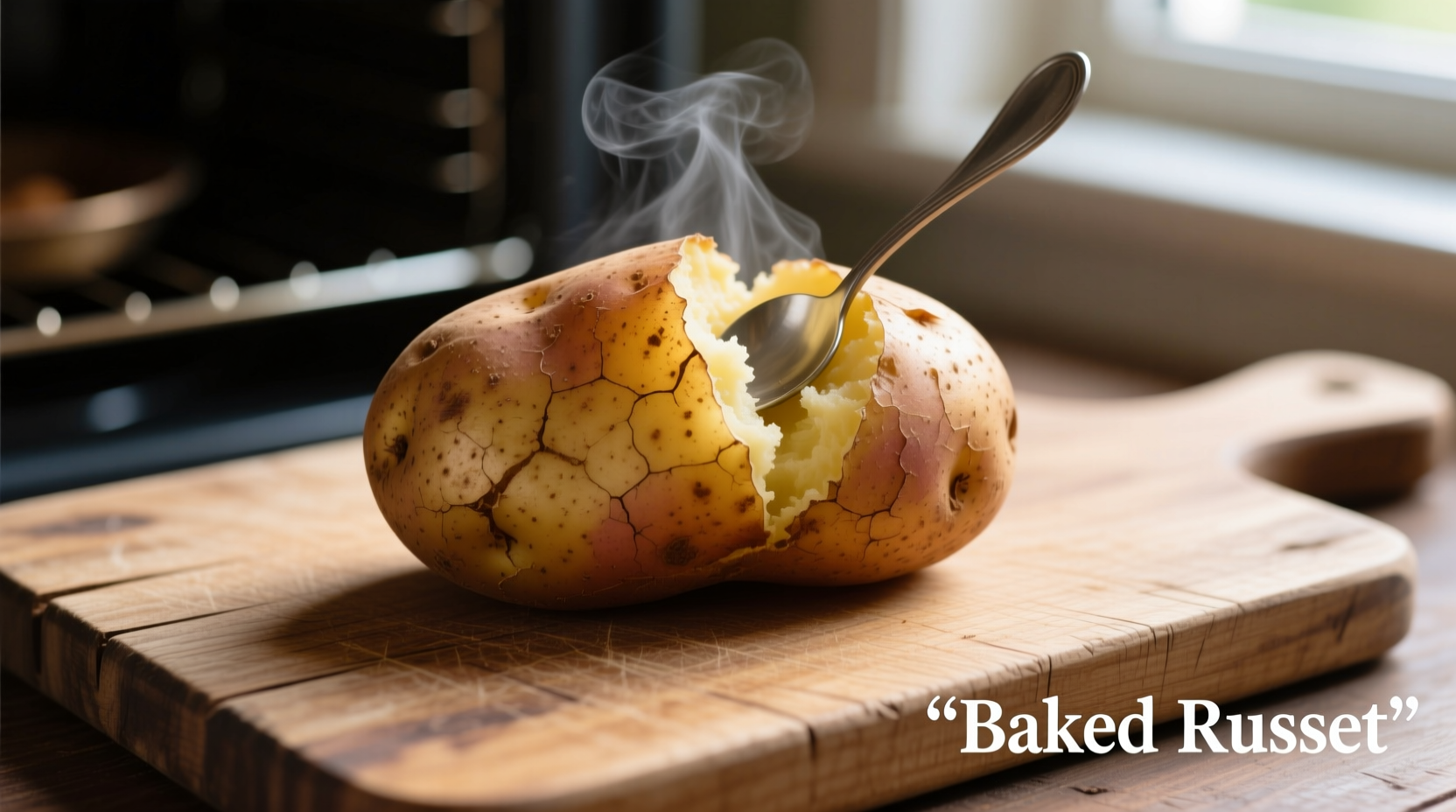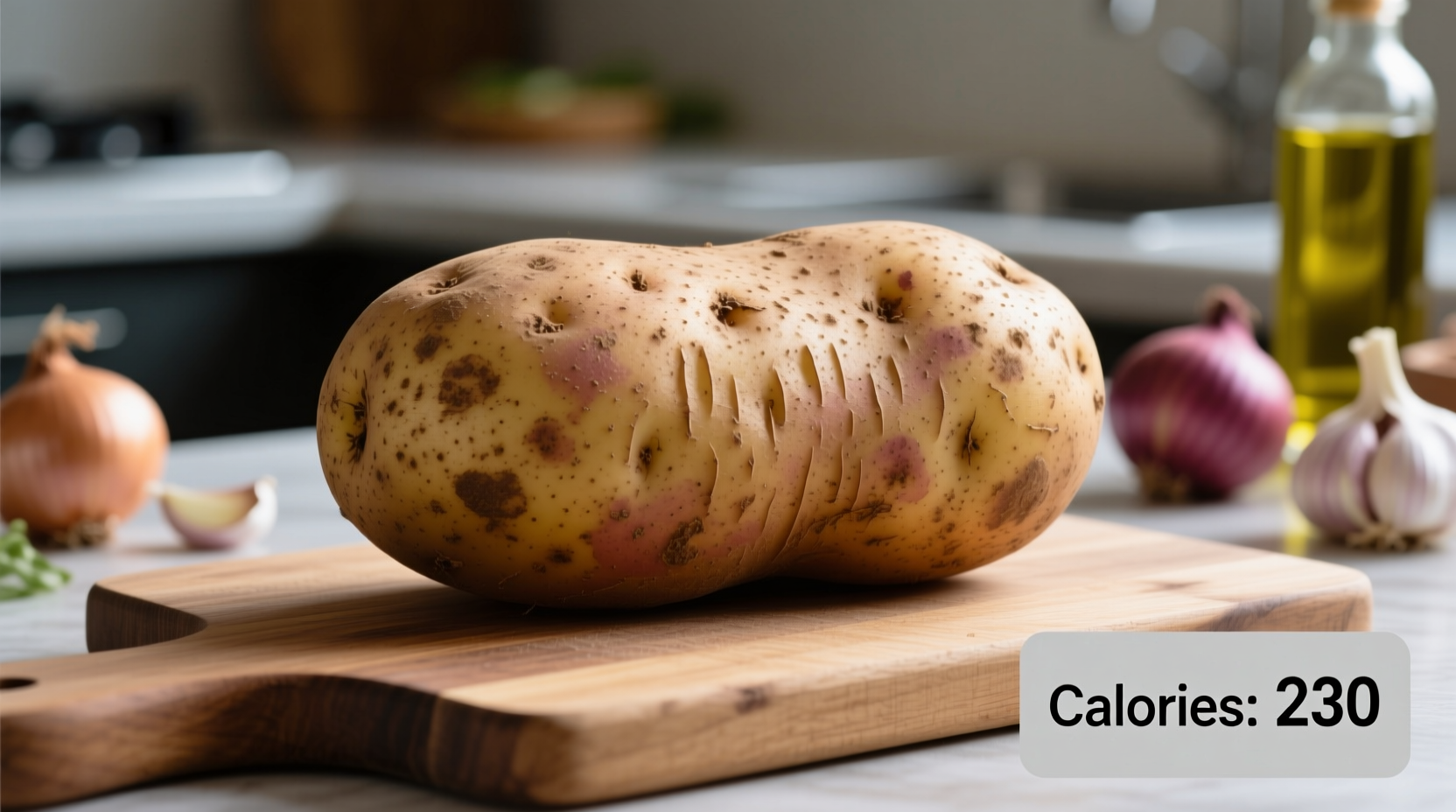Understanding the exact nutritional profile of common foods helps make informed dietary choices. Whether you're tracking calories for weight management, planning balanced meals, or simply curious about what you're eating, knowing the precise calorie content and nutritional value of staple foods like russet potatoes is essential.
What Exactly Constitutes a "Large" Russet Potato?
Before examining calorie content, it's important to clarify portion sizes. According to the USDA FoodData Central, a "large" russet potato typically weighs approximately 369 grams (about 13 ounces) with skin. This standard measurement ensures consistency when comparing nutritional information across sources.

Detailed Nutritional Breakdown of a Large Russet Potato
The calorie count alone doesn't tell the complete nutritional story. Here's the comprehensive nutritional profile for a large baked russet potato with skin:
| Nutrient | Amount | % Daily Value* |
|---|---|---|
| Calories | 290 | 15% |
| Total Carbohydrates | 63g | 23% |
| Dietary Fiber | 8.5g | 34% |
| Protein | 8g | 16% |
| Vitamin C | 72mg | 80% |
| Potassium | 1600mg | 46% |
| Vitamin B6 | 0.9mg | 53% |
*Based on a 2,000-calorie diet. Source: USDA FoodData Central, National Nutrient Database for Standard Reference
How Cooking Methods Impact Calorie Content
The preparation method significantly affects the final calorie count of your potato. Here's how different cooking techniques change the nutritional profile:
- Baked with skin: 290 calories (retains maximum nutrients)
- Boiled with skin: 260 calories (some water-soluble nutrients leach into water)
- Mashed (without additions): 240 calories (slight reduction due to water absorption)
- Fried: 350+ calories (absorbs significant oil during cooking)
- Air-fried: 310 calories (uses minimal oil compared to deep frying)
According to research published in the American Journal of Clinical Nutrition, baking potatoes with skin preserves more nutrients compared to boiling, particularly water-soluble vitamins like vitamin C and B vitamins that can leach into cooking water.
Practical Applications for Health-Conscious Eaters
Understanding how russet potatoes fit into your dietary goals is crucial for making informed choices:
Portion Control Strategies
While nutrient-dense, potatoes are relatively high in carbohydrates. For balanced meals:
- Pair a medium potato (150-170g) with lean protein and non-starchy vegetables
- Use the "plate method": ¼ plate potatoes, ¼ lean protein, ½ non-starchy vegetables
- Consider replacing half your potato portion with cauliflower for reduced carbs
Healthy Topping Alternatives
The toppings you choose dramatically impact the final calorie count:
- Traditional toppings: Sour cream (110 cal/tbsp), butter (100 cal/tbsp), cheese (110 cal/tbsp)
- Healthier alternatives: Greek yogurt (30 cal/tbsp), salsa (10 cal/tbsp), steamed broccoli (30 cal/cup)
Registered dietitians from the Academy of Nutrition and Dietetics recommend focusing on preparation methods that enhance nutrient retention while minimizing added fats and sugars for optimal health benefits.
Comparing Russet Potatoes to Other Varieties
Russet potatoes differ nutritionally from other common potato varieties:
| Potato Type | Calories (Large) | Carbohydrates | Key Nutritional Differences |
|---|---|---|---|
| Russet | 290 | 63g | Higher in potassium, ideal for baking and mashing |
| Sweet Potato | 180 | 41g | Higher in vitamin A (beta-carotene), lower glycemic index |
| Red Potato | 260 | 59g | Higher in vitamin K, better for boiling and salads |
| Yukon Gold | 270 | 61g | Naturally buttery flavor, good source of iron |
While sweet potatoes often get praised for their vitamin A content, russet potatoes actually provide more potassium and comparable fiber content. The National Center for Biotechnology Information notes that all potato varieties offer valuable nutrients when prepared healthily, with the choice depending more on culinary application than significant nutritional superiority.
Common Misconceptions About Potato Nutrition
Several myths persist about potato nutrition that deserve clarification:
- "Potatoes are just empty carbs" - False. They provide substantial fiber, vitamins, and minerals
- "Potatoes cause weight gain" - Potatoes themselves are not fattening; preparation methods and portion sizes determine impact
- "Sweet potatoes are always healthier" - Both have nutritional strengths; russets provide more potassium while sweet potatoes offer more vitamin A
- "Potato skins are unhealthy" - Actually, potato skins contain nearly half the fiber and many nutrients
A 2022 review in Nutrients journal concluded that potatoes can be part of healthy dietary patterns when prepared using methods that minimize added fats and sugars, and when consumed as part of balanced meals with adequate vegetables and protein sources.
Integrating Russet Potatoes Into Balanced Meal Plans
Here are practical ways to include russet potatoes in various dietary approaches:
- For weight management: Use as a carbohydrate source in moderation (1/2 large potato), focus on baking or boiling, and load with vegetable toppings
- For athletic performance: Consume baked russet potatoes post-workout for carbohydrate replenishment and potassium recovery
- For blood sugar management: Pair with protein and healthy fats, cool after cooking to increase resistant starch, and monitor portion sizes
- For general health: Include 1-2 times weekly as part of varied vegetable intake, keeping skin for maximum fiber
Registered dietitians emphasize that the context of the entire meal matters more than any single food item. When russet potatoes replace less nutritious carbohydrate sources and are prepared healthily, they contribute valuable nutrients to the diet.
Frequently Asked Questions
How many calories are in a large russet potato without skin?
A large russet potato without skin (approximately 300g) contains about 260 calories. Removing the skin reduces the fiber content significantly (from 8.5g to about 4g) and decreases some nutrient levels, as many vitamins and minerals are concentrated near the skin.
Do cooled potatoes have fewer calories?
The total calorie count remains the same when potatoes cool, but cooling increases resistant starch content by 10-15%. This resistant starch functions more like fiber in the body, meaning fewer net digestible carbohydrates. A large cooled russet potato still contains approximately 290 calories, but may have 5-10g fewer net carbs.
Are russet potatoes healthy for weight loss?
Yes, when prepared properly and portion-controlled. Russet potatoes provide substantial fiber and nutrients that promote satiety. A medium russet potato (150-170g) contains about 170 calories and 3g of fiber, making it a satisfying carbohydrate source. The key is avoiding high-calorie toppings and fried preparations that significantly increase the calorie density.
How does the glycemic index of russet potatoes compare to other carbohydrates?
Russet potatoes have a moderate to high glycemic index (70-85 when hot), but this decreases significantly when cooled. Compared to white bread (GI 70-85) and white rice (GI 70-85), russet potatoes fall in a similar range. However, pairing potatoes with protein, fat, or vinegar can lower the overall glycemic impact of the meal by 20-30%.
Can I eat russet potatoes on a low-carb diet?
Traditional low-carb diets (under 50g carbs daily) typically limit potato consumption. However, a small russet potato (100g) contains about 17g net carbs, which could fit into more moderate low-carb approaches. For strict low-carb diets, consider substituting with lower-carb vegetables like cauliflower, but recognize that potatoes offer unique nutrient profiles not easily replicated.











 浙公网安备
33010002000092号
浙公网安备
33010002000092号 浙B2-20120091-4
浙B2-20120091-4